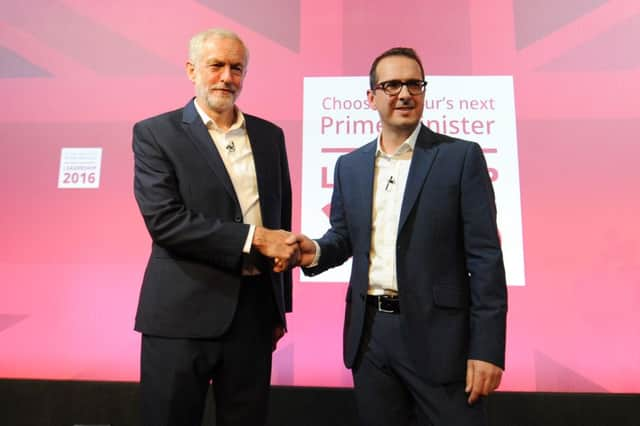Leaders: Labour fighting against the tide benefits no-one


There was good news for Labour leader Jeremy Corbyn yesterday as his beleaguered party gained a seat in Fife, coinciding with his series of engagements as he brought his leadership campaign to Scotland.
Taking the seat of the last elected Communist councillor in the UK, even if the post holder was latterly an independent, is hardly going to start a revolution. But the result was an improvement on much of the rest of the Labour leader’s week.
Advertisement
Hide AdAdvertisement
Hide AdGiven his luck so far, that result in the Lochs ward must have come as a blessed relief.
First, Scottish Labour leader Kezia Dugdale, who last September congratulated Corbyn on winning the Labour leadership saying it reflected people’s desire for “radical change and straight talk” and said she was looking forward to working with him, revealed she would be supporting his rival Owen Smith.
Then there was the messy “traingate” episode where it appeared that he had split hairs about not being able to find a seat on a Virgin train after boarding it with his wife and team members. It later emerged that he had wanted to sit beside his wife but was unable to do so because of seat reservations. But, not one to lose an opportunity he sat on the floor to broadcast a call for re-nationalisation and tapped into the zeitgeist of the disgruntled rail commuter, a key voting demographic.
After that stunt backfired next came the hustings event in Glasgow where he went head to head with his rival. Smith’s needling about Brexit suggested that Corbyn had voted Out instead of In at the EU referendum.
Normally anyone under this kind of attack would be holed below the waterline. But the good ship Corbyn sails on and is still expected to win the leadership ballot, having won the hearts and minds of many who drifted away during the New Labour era.
Charmed life, then? Not exactly. Seeing off a leadership challenge would be one thing. But his problem is that this is the only popularity contest he is likely to win. And if he was seen as unelectable at a general election last week, where do the events of the last few days leave him now? Struggling to retain his deposit?
If Prime Minister Theresa May called an election before the end of the year to legitimise her new government post-Cameron, she would cruise back into power, Brexit or not.
Is there anyone out there who truly believes Corbyn will one day be prime minister? Even his acolytes must know that this is more about an internal party struggle than about finding someone who the public would want to run the country.
Advertisement
Hide AdAdvertisement
Hide AdIn some ways, that is okay. Labour has to find its way, and choosing the right leader is part of the process. But at this rate, there looks little prospect of consensus being reached any time soon. Which is not good for UK democracy, because an unelectable Labour Party puts the result of a UK general election beyond doubt before it is held. In other words, a non-event.
Labour has to sort out its house as soon as possible. Events of this week suggest it is further away from doing so than ever.
China a lucrative route for Scotland
The announcement there could be a China route from Edinburgh airport if the Scottish Government cuts air passenger duty (APD) sounds like a “win-win” situation all round.
Those wanting to go beyond the average holiday destination would be able to fly from Scotland and pay less into the bargain while the lucrative Chinese market would provide a welcome boost to the economy.
Figures show that the average Chinese tourist spends ten days in the UK, spending around £3,000 per trip. Their visits raise £3 billion in revenue each year with more of them travelling north to Scotland from London than average among UK tourists.
But it would be easy to see an announcement by the airport’s chief executive Gordon Dewar that the China route could come sooner if the Scottish Government speeded up its plans to halve the tax from 2018 as an attempt to apply pressure.
That might well be the case.
But it flags up the factors to be considered in the debate on cutting the tax. A China route looks very attractive but does the end justify the means? Introduced over 20 years ago, APD was meant to make people think twice about the environmental impact of travel. How many do?
The government needs support to get changes through. Perhaps the debate will provide the kind of checks and balances such legislation requires.
Advertisement
Hide AdAdvertisement
Hide AdThe Scottish Government was hammered this week over the GERS figures. If APD is put forward as a possible means of growing the Scottish economy, it deserves a mature debate rather than outright rejection motivated by political differences.